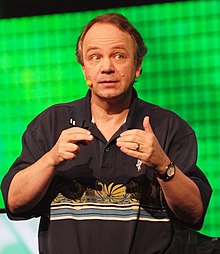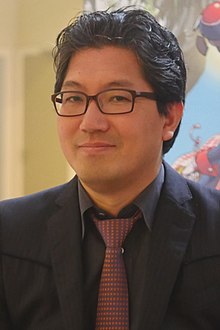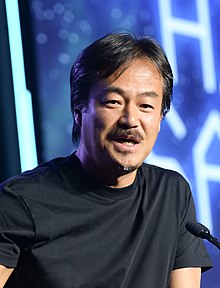Portal:Video games
The Video Games Portal

A video game, also known as a computer game or just a game, is an electronic game that involves interaction with a user interface or input device (such as a joystick, controller, keyboard, or motion sensing device) to generate visual feedback from a display device, most commonly shown in a video format on a television set, computer monitor, flat-panel display or touchscreen on handheld devices, or a virtual reality headset. Most modern video games are audiovisual, with audio complement delivered through speakers or headphones, and sometimes also with other types of sensory feedback (e.g., haptic technology that provides tactile sensations). Some video games also allow microphone and webcam inputs for in-game chatting and livestreaming.
Video games are typically categorized according to their hardware platform, which traditionally includes arcade video games, console games, and computer (PC) games; the latter also encompasses LAN games, online games, and browser games. More recently, the video game industry has expanded onto mobile gaming through mobile devices (such as smartphones and tablet computers), virtual and augmented reality systems, and remote cloud gaming. Video games are also classified into a wide range of genres based on their style of gameplay and target audience. (Full article...)
Featured articles –
Development began in 1997, during the English localization of Final Fantasy VII. The game builds on the visual changes brought to the series by VII, including the use of 3D graphics and pre-rendered backgrounds, while also departing from many Final Fantasy traditions. It is the first Final Fantasy to use realistically proportioned characters consistently, feature a vocal piece as its theme music and forgo the use of magic points for spellcasting.
Final Fantasy VIII was well received by critics. The game was a commercial success, grossing $151 million in its first day of release in Japan, and more than $50 million during its first 13 weeks in North America, making it the fastest-selling Final Fantasy title until Final Fantasy XIII, a multi-platform release. A Windows port followed in 2000, with the addition of the Chocobo World minigame. Final Fantasy VIII was re-released worldwide as a PSOne Classic on the PlayStation Store in 2009, for PlayStation 3 and PlayStation Portable, with support for PlayStation Vita in 2012. It was re-released via Steam in 2013. By August 2019, it had sold more than 9.6 million copies worldwide. A remastered version was released for Nintendo Switch, PlayStation 4, Windows, and Xbox One in September 2019, and Android and iOS in March 2021. (Full article...)
Four games were released in the series between 1991 and 1999: the original Seiken Densetsu (1991)—Final Fantasy Adventure in North America and Mystic Quest in Europe—for the Game Boy, Secret of Mana (1993) for the Super Nintendo Entertainment System, Trials of Mana (1995) for the Super Famicom, and Legend of Mana for the PlayStation. A remake of the original game, Sword of Mana (2003), was published for the Game Boy Advance. All of the original games were action role-playing games, though they included a wide variety of gameplay mechanics, and the stories of the games were connected only thematically.
In 2006 and 2007, four more games were released as part of the World of Mana subseries, an attempt by Square Enix to release games in a series over a variety of genres and consoles. These were Children of Mana (2006), an action-oriented dungeon crawler game for the Nintendo DS; Friends of Mana (2006), a Japan-only multiplayer role-playing game for mobile phones; Dawn of Mana (2006), a 3D action-adventure game for the PlayStation 2; and Heroes of Mana (2007), a real-time strategy game for the DS. Children was developed by Nex Entertainment and Heroes by Brownie Brown, founded by several developers of Legend, though Ishii oversaw development of all four games. Three more games have been released since the World of Mana subseries ended: Circle of Mana (2013), a Japan-only card battle game for the GREE mobile platform, Rise of Mana (2014), a Japan-only free-to-play action role-playing game for iOS, Android, and PlayStation Vita, and Adventures of Mana (2016), a 3D remake of Final Fantasy Adventure for the PlayStation Vita, iOS, and Android. In addition to the games, four manga series and one novelization have been released in the Mana franchise. (Full article...)
Crush's primary gameplay feature involves manipulating each game level between 3D and 2D views, allowing the player to reach platforms and locations inaccessible from within a different view. This element was noted by critics to be similar to one in Super Paper Mario, also released in 2007, though the Zoë Mode team had envisioned the concept five years prior. Crush received positive reviews upon release, with critics praising its incorporation of this dimension-shifting component alongside other aspects of the game presentation. Though Crush won several gaming awards, including PSP game of the month, it failed to meet the developer's sales expectations. A port of the game for the Nintendo 3DS called CRUSH3D was announced in January 2011 and was made available in January 2012 in Europe; in February 2012 in Australia; and in March 2012 in North America. (Full article...)
Portal consists primarily of a series of puzzles that must be solved by teleporting the player's character and simple objects using "the Aperture Science Handheld Portal Device", also referred to as the "portal gun", a device that can create intra-spatial portals between two flat planes. The player-character, Chell, is challenged and taunted by an artificial intelligence named GLaDOS (Genetic Lifeform and Disk Operating System) to complete each puzzle in the Aperture Science Enrichment Center using the portal gun with the promise of receiving cake when all the puzzles are completed. The Source Engine's physics system allows kinetic energy to be retained through portals, requiring creative use of portals to maneuver through the test chambers. This gameplay element is based on a similar concept from the game Narbacular Drop; many of the team members from the DigiPen Institute of Technology who worked on Narbacular Drop were hired by Valve for the creation of Portal, making it a spiritual successor to the game.
Portal was acclaimed as one of the most original games of 2007, despite some criticism for its short duration. It received praise for its originality, unique gameplay and a dark story and sense of comedy. GLaDOS, voiced by Ellen McLain in the English-language version, received acclaim for her unique characterization, and the end credits song "Still Alive", written by Jonathan Coulton for the game, was praised for its original composition and humor. Portal is often cited as one of the greatest video games ever made. Excluding Steam download sales, over four million copies of the game have been sold since its release, spawning official merchandise from Valve including a model portal gun and plush Companion Cubes, as well as fan recreations of the cake. (Full article...)
Did you know... -
- ... that Splatoon 3 became the fastest-selling video game of all time in Japan three days after launch?
- ... that the contrabass trombone has experienced a revival in film music and video game soundtracks?
- ... that the 1987 video game Oriental Hero was panned as "so incredibly bad it's almost worth a look"?
- ... that Elena from the video game series Street Fighter uses a capoeira fighting style, for which the development team used travel videos as reference material as they had no experience with the style?
- ... that the developers of the video game Golf Club: Wasteland jokingly announced that they would only sell one copy at a price of $500 million?
- ... that the 1979 video game Superman was one of the first console games with a pause feature?
- ... that the name of the video game mod series Bomba Patch was inspired by éclairs?
- ... that the video game Pyongyang Racer was developed in North Korea for Koryo Tours, which organises tours to the country?
- ... that the case Lewis Galoob Toys, Inc. v. Nintendo of America, Inc. was considered essential to the future of video game modding in the United States in 1992?
- ... that after becoming paralyzed from the neck down, Rocky "RockyNoHands" Stoutenburgh broke two Guinness World Records in the video game Fortnite?
- ... that classified documents of the United States were partially leaked onto a Discord server for the video game Minecraft?
- ... that the 1999 video game Interplay Sports Baseball Edition 2000 used a public-address announcer while its rivals were switching to two commentators as featured on real MLB game broadcasts?
Selected biography –
Selected image -

Recent video game-related events
- August 15, 2024 –
- American video game magazine Game Informer discontinues publication after 33 years. The magazine's website is also shut down. (BBC News)
- May 24, 2024 – Uvalde school shooting
- Families in Uvalde, Texas, U.S., file a lawsuit against Daniel Defense and Activision Blizzard for creating the DDM4 V7 gun and promoting the weapon through the game Call of Duty, respectively. They also sue Meta Platforms for owning Instagram, which was used by the gunman. (AP)
- April 16, 2024 – 2023–2024 video game industry layoffs
- American video game company Take-Two Interactive lays off 5% of its workforce. (Reuters)
Topics
Categories
Things you can do
In other Wikimedia projects
The following Wikimedia Foundation sister projects provide more on this subject:
-
Commons
Free media repository -
Wikibooks
Free textbooks and manuals -
Wikidata
Free knowledge base -
Wikinews
Free-content news -
Wikiquote
Collection of quotations -
Wikisource
Free-content library -
Wikiversity
Free learning tools -
Wiktionary
Dictionary and thesaurus












































